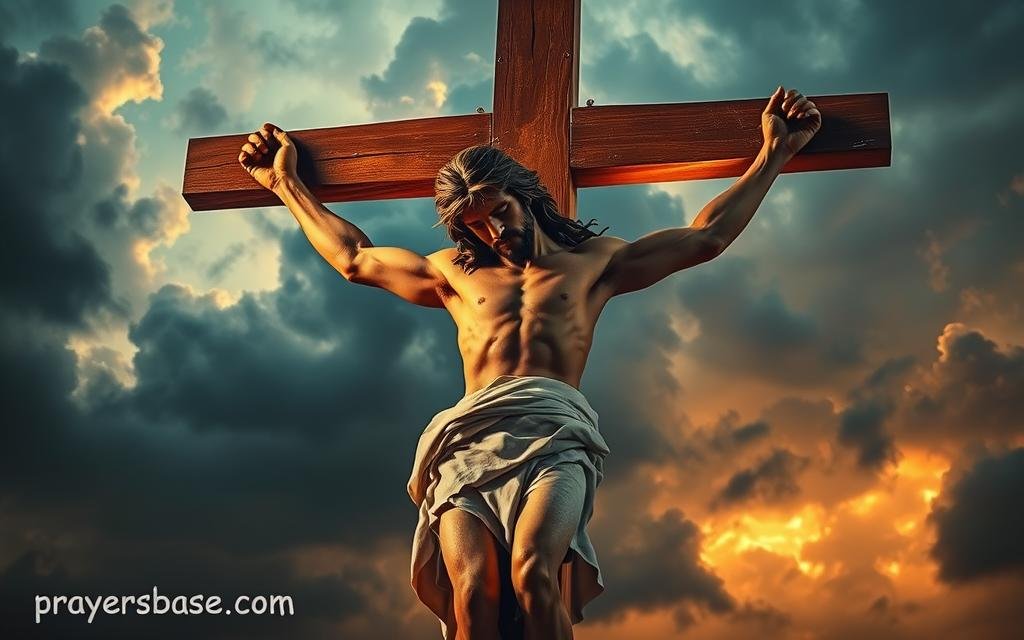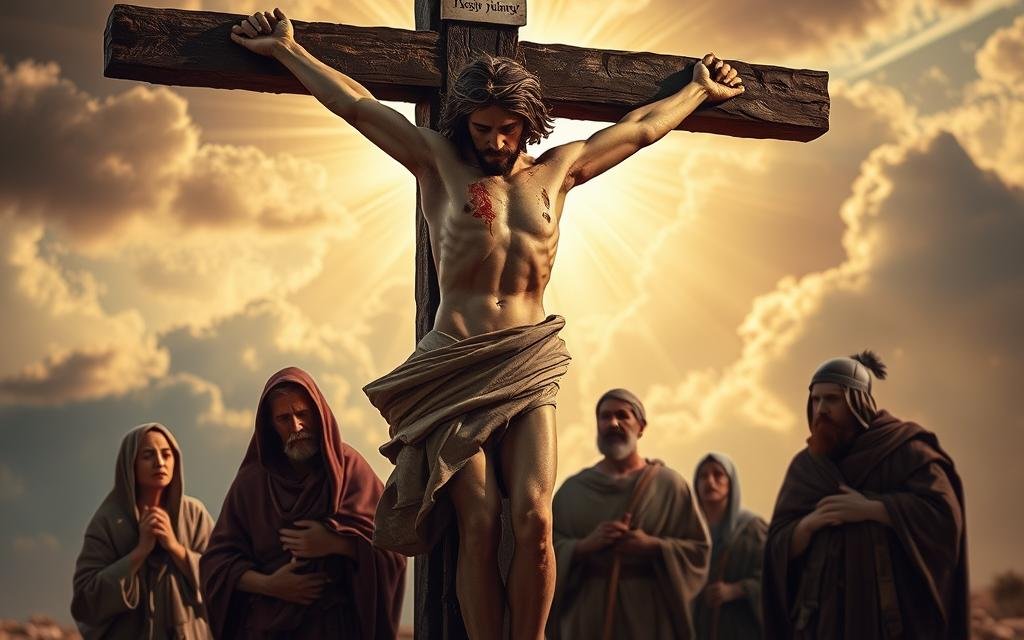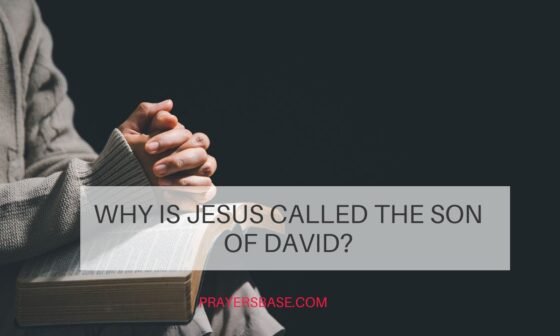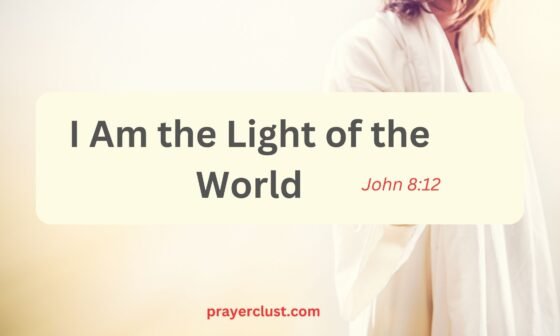Ever thought about why Jesus’ death on the cross is so important? It’s not just a story from history. It’s a deep spiritual journey that touches many lives around the world.
Looking into why Jesus died, we find a story of love and sacrifice. His death was not random violence. It was a plan to fix our broken relationship with God.
This story offers hope. Jesus chose to suffer to help us heal and connect with God forever. His death shows us God’s love, fixing our brokenness with grace.
We will look closely at the meaning behind Jesus’ death. We’ll explore the Bible’s prophecies and how his sacrifice changes us. It’s a journey of personal growth for believers.
Let’s explore the mystery of the cross together. It shows God’s strong will to save and redeem us.
Why Did Jesus Have to Die on the Cross?

Jesus’ death is more than a historical event. It shows the ultimate sacrifice that connects us to God. This moment shows us the depth of God’s love and how we can be saved.
Long before Jesus was born, prophets spoke of his sacrifice. Isaiah said a servant would carry our sins and offer forgiveness.
The Prophecy of Messianic Suffering
Key parts of this prophecy include:
- A servant despised and rejected by people
- Someone carrying our griefs and sorrows
- Wounded for our transgressions
- Offering healing through his sacrifice
Jesus’ Willingness to Suffer
In the Garden of Gethsemane, Jesus showed great grace. He wrestled with the huge task of taking on humanity’s sin, but stayed true to God’s plan. His prayer showed his human side and his divine purpose.
Substitutionary Atonement
Jesus’ death is seen as a direct act for our sins. By taking our punishment, Jesus made a way for us to be reconciled with God. This act shows the ultimate love – giving everything for our forgiveness and eternal life.
Through his death, Jesus changed how we relate to God. He offers hope and redemption to all who accept this amazing gift of grace.
What Jesus’ Death on the Cross Accomplished
The cross is a symbol of love and redemption in Christian teaching. It shows how Jesus’ sacrifice changed our relationship with God. This moment in history brings hope and restoration.

- Redemption of Humanity: Jesus paid the ultimate price to free us from sin
- Reconciliation with God: He bridged the gap between us and God
- Spiritual Victory: He defeated sin and death forever
Redemption and Forgiveness of Sins
Jesus’ sacrifice gave us a way to be forgiven completely. Ephesians 1:7 says our sins are wiped away by His blood. This gives us spiritual cleansing.
Reconciliation with God
Reconciliation is more than forgiveness. It’s about fixing our relationship with God. 2 Corinthians 5:18-19 says we go from enemies to beloved children. We get to connect deeply with God.
Victory Over Sin and Death
Christ’s resurrection shows He won the battle. 1 Corinthians 15:55-57 says death is defeated. This gives us hope beyond this world.
The Meaning of Jesus’ Sacrifice for Believers Today
Christianity teaches us about sacrifice through Jesus’ act of love. The Bible shows us a message that changes lives today. By understanding Christ’s sacrifice, we learn about love, freedom, and purpose.
A Model of Selfless Love and Sacrifice
Jesus shows us the ultimate selfless love. He gave his life for us, showing love beyond our understanding. Christian teachings say we should love like Jesus:
- Putting others’ needs before our own
- Showing compassion without expecting anything in return
- Forgiving others, even when it’s hard
Opening the Way to Eternal Life
Christian hope is built on eternal life. John 3:16 tells us God’s love is so great, it gives us eternal life through Jesus. This hope changes how we see challenges and our purpose.
Living in True Freedom
Jesus’ death brings us spiritual freedom. Galatians 5:1 says we are free from sin’s power. This freedom is real now, helping us live true and meaningful lives.
Thinking about Jesus’ sacrifice invites us to live with love, hope, and freedom. This changes everything.
The Spiritual and Emotional Impact of Jesus’ Death on the Cross
During Easter and Good Friday, we think deeply about Jesus’ crucifixion. It shows us a story of love, sacrifice, and spiritual healing. This story changes how we see suffering.
The crucifixion is more than just a historical event. It’s a journey of deep spiritual pain and healing. Jesus felt pain that went beyond just physical.
The Depths of Physical and Spiritual Suffering
Jesus went through a lot of pain during his crucifixion. His suffering was in many ways:
- He felt intense physical pain from being crucified.
- He felt alone from God.
- He carried the sins of all people.
- He was humiliated in front of everyone.
Transformative Words from the Cross
When Jesus said “It is finished”, he meant more than just the end of his life. His words showed:
- God’s plan of redemption was complete.
- He had kept all the promises.
- He had won over sin and death.
Through his sacrifice, Jesus showed us the greatest love. This love inspires and challenges people all over the world.
The Significance of the Cross in Christian Faith
The cross is a powerful symbol in Christian faith. It means more than just a historical event. It shows the deep idea of salvation and redemption in the Bible.
It touches the heart of our faith. Christ’s sacrifice shows God’s love in a way that changes how we see our relationship with God.
The cross has many important parts of Christian belief:
- A demonstration of unconditional love
- The pathway to spiritual redemption
- A bridge between humanity and God
- The ultimate act of sacrificial grace
The Cross as God’s Love Revealed
Looking at the cross, we see more than just suffering. We see God’s deep love for humanity. Romans 5:8 tells us that while we were sinners, Christ died for us. This shows divine love that goes beyond what we can understand.
Worship Centered on the Cross
Christian worship finds its deepest meaning in the cross. It’s not just a symbol but a reality that changes our spiritual journey. Through the cross, we learn that salvation is a gift, not something we earn.
Our worship is a thank you for this amazing gift of redemption.
When we really understand the cross, it changes how we see life, faith, and our relationship with God.
Common Misunderstandings About Jesus’ Death and the Cross
Exploring Jesus’ crucifixion brings up many wrong ideas. These ideas mess with our grasp of grace, forgiveness, and what Christians believe. They make us wonder about the real meaning of Jesus’ death.
Many find it hard to get the deep meaning of Christ’s sacrifice. Some doubt if his death was needed. Others get the wrong idea about sin and being saved.
Was Jesus’ Death Really Necessary?
Getting God’s plan of salvation needs deep thought. The cross is more than a historical event. It’s a key moment in fixing our spiritual relationship with God. Important things to think about include:
- Sin makes a big gap between us and God
- Jesus’ death closes this gap
- God’s justice needs us to face our wrongs
- Grace helps us heal spiritually
Do We Escape Consequences Through Jesus’ Sacrifice?
Many think Jesus’ death means we don’t have to face our sins. This is not true. While forgiveness is given freely, we must deal with our actions’ effects. Christian beliefs are about growing and changing, not just getting off easy.
Our spiritual path is about accepting grace, learning from our mistakes, and making things right with God and others.
Conclusion
Reflecting on Jesus’ crucifixion, our hearts feel God’s deep love. The cross shows us the power of redemption in Christianity.
Christ’s sacrifice is more than a historical event. It offers hope and healing on our spiritual journey. Through the cross, we find:
- Complete forgiveness of sins
- Reconciliation with God
- Freedom from spiritual bondage
- A path to eternal salvation
We should thank God for this gift. We are called to live in the light of Christ’s sacrifice. It changes our lives, relationships, and how we see divine love.
The cross brings us closer to God. It shows we’re not alone in our struggles. It’s a sign of hope, restoration, and God’s love for us.
See the cross as more than a concept. Let it change your life, bringing hope, healing, and purpose to everything you do.
Reflect on the Cross and Live in Its Power
Our journey through the biblical teachings of Jesus’ sacrifice invites us to a profound personal reflection. The gospel reveals a divine love that transforms lives. It challenges us to look beyond mere intellectual understanding.
Take time to explore how the cross speaks directly to your christian beliefs. What does Christ’s ultimate sacrifice mean for your personal struggles, relationships, and spiritual growth? Consider creating a journal or engaging in meaningful conversations with fellow believers.
The power of the cross extends far beyond church walls or special religious occasions. It’s a daily invitation to live in freedom, grace, and radical love. We are called to let Christ’s sacrifice shape our actions, heal our wounds, and guide our interactions with others.
Let this moment be more than just reading – it’s an opportunity to recommit yourself to a life transformed by Christ’s incredible sacrifice. Open your heart to the profound spiritual journey ahead, embracing the hope and redemption offered through the cross.
FAQ
Why did Jesus have to die on the cross?
Jesus’ death was part of God’s plan to save us. It was a big step in showing God’s love. By dying, Jesus took our sins upon Himself, making a way for us to be forgiven and have eternal life.
Was Jesus’ death on the cross really necessary?
Yes, it was necessary. It was not an accident but a key part of God’s plan. Jesus’ death solved the problem of sin, showing God’s justice and mercy at the same time.
How does Jesus’ death impact Christians today?
It brings forgiveness, hope, and freedom. It shows us what love looks like and opens the door to eternal life. Through His sacrifice, we can live without sin’s control and feel God’s love deeply.
What is substitutionary atonement?
It means Jesus took our place on the cross. He suffered for our sins, so we could be forgiven and reconciled with God. It’s a powerful act of love and sacrifice.
Did Jesus suffer only physical pain on the cross?
No, He felt both physical pain and deep spiritual pain. The crucifixion was hard, but the weight of our sins was even harder. This shows how much God loves us and how serious sin is.
Does Jesus’ death mean we no longer face consequences for our actions?
No, it doesn’t erase the effects of our actions in the world. But it does offer spiritual redemption and freedom from sin. We are free to choose, but we must face the results of our choices.
How can I personally apply the meaning of Jesus’ death to my life?
Live like Jesus, with selfless love. Enjoy the freedom He gives and let His love change you. Think about His sacrifice often and let it guide you in your actions and heart.







